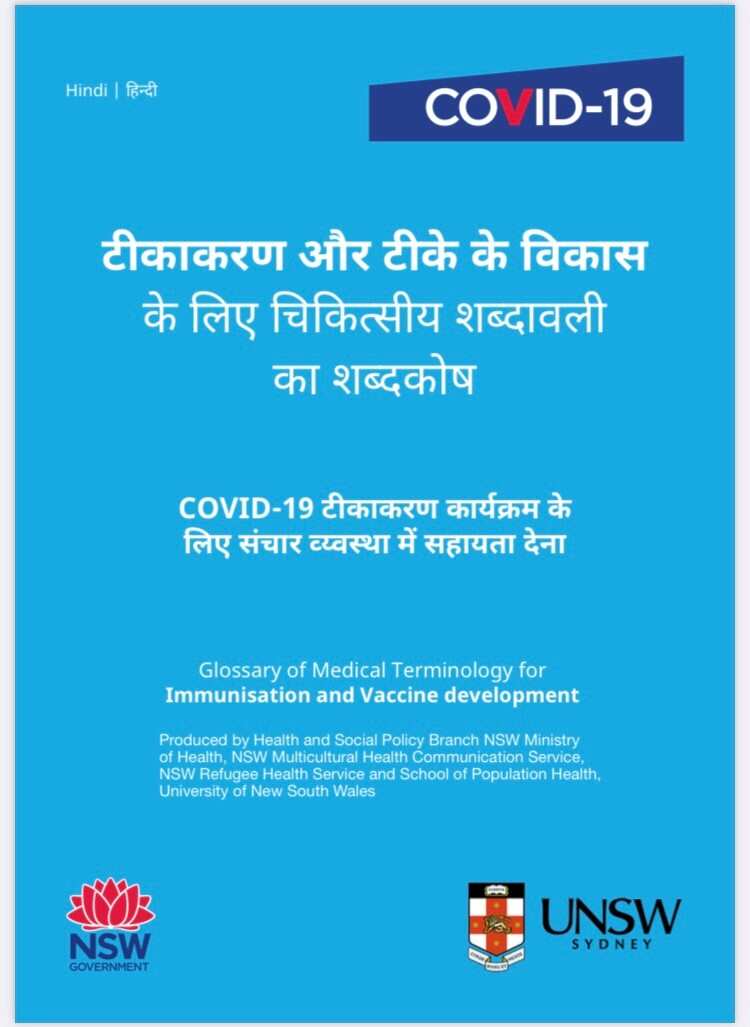Terminology like antibodies, asymptomatic, Australian Immunisation Register, booster injection, efficacy and dose may have become buzzwords today, but their precise meaning may not be clear to many, especially those from CALD communities and those who speak a language other than English (LOTE).
The Translated COVID-19 Glossary of Immunisation and Vaccine Development, launched in several languages including Hindi, is expected to assist community organisations, translators, interpreters, bilingual workers and community leaders to better understand and communicate about the coronavirus vaccine development and its implementation.
Highlight:
- NSW launches multi-language glossary on COVID medical terminology to spread vaccine awareness
- Glossary released in languages like Hindi, Tamil and Bangla to assist CALD communities
- Glossary can be accessed through NSW Multicultural Health Communication Services
The Hindi glossary is a 21-page document which has been translated and edited by two Australian residents Varun Sud and Anusheree Jain.
A collaboration amongst NSW Multicultural Health Communication Service, the University of New South Wales and the Ministry of Health, this glossary has been developed by a team including Associate Professor Holly Seale of the School of Population Health, University of New South Wales, Lisa Woodland, Director of NSW Multicultural Health Communication Service, Dr Kylie Quinn from the School of Health and Biomedical Sciences at RMIT University and Dr Sabira Shrestha from the National Centre for Immunisation Research and Surveillance. While launching the glossary via a webinar, Prof Seale said, “from the recent data that was released by Australian Bureau Statistics, we know there’s still a portion of people in our community who may have not made up their mind about the vaccine.
While launching the glossary via a webinar, Prof Seale said, “from the recent data that was released by Australian Bureau Statistics, we know there’s still a portion of people in our community who may have not made up their mind about the vaccine.

The 21-page Hindi glossary on COVID-19 Immunisation and Vaccine development. Source: Credited/NSW Multicultural Health Communication Service.
“They may have some uncertainties about whether or not they are eligible to get vaccinated or also who wish not to get vaccinated,” she added.
Prof Seale also mentioned how people were concerned about getting information of vaccination sites.
“This is the group I like to refer to as the ‘fence sitters’,” she said indicating that vaccination hesitancy could be reduced by using the information available through this glossary. “People who speak a language other than English, are more likely to register as not being sure about the vaccine. And this is where we need to focus our efforts and ensure that we have support and resources available to have impactful conversations,” Prof Seale elaborated.
“People who speak a language other than English, are more likely to register as not being sure about the vaccine. And this is where we need to focus our efforts and ensure that we have support and resources available to have impactful conversations,” Prof Seale elaborated.

COVID-19 glossary in Hindi is available on NSW Multicultural Health Communication Services website. Source: AAP Image/AP Photo/Mary Altaffer
She added that consultations with several community organisations and other associations prompted the need to develop this glossary that is likely to help the conversations about and around COVID-19 in other languages.
